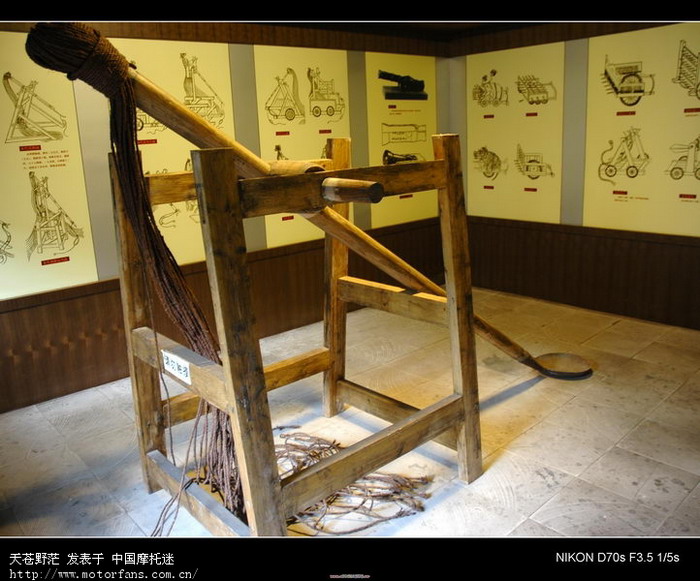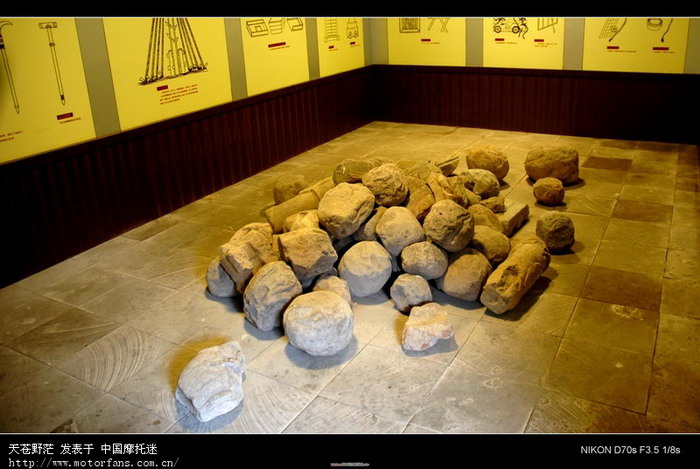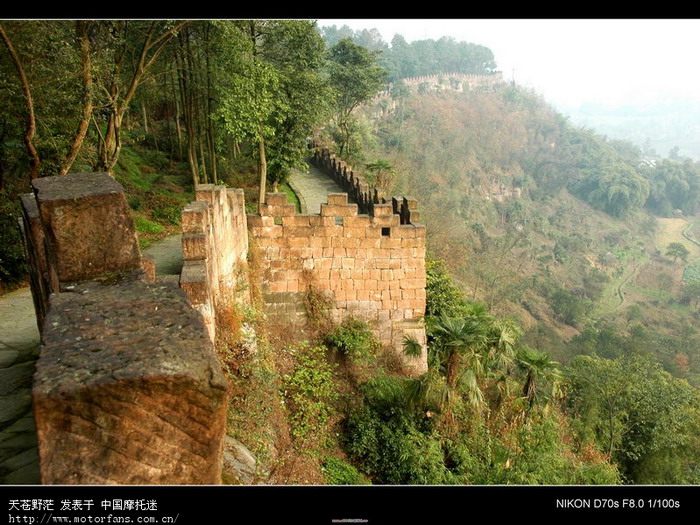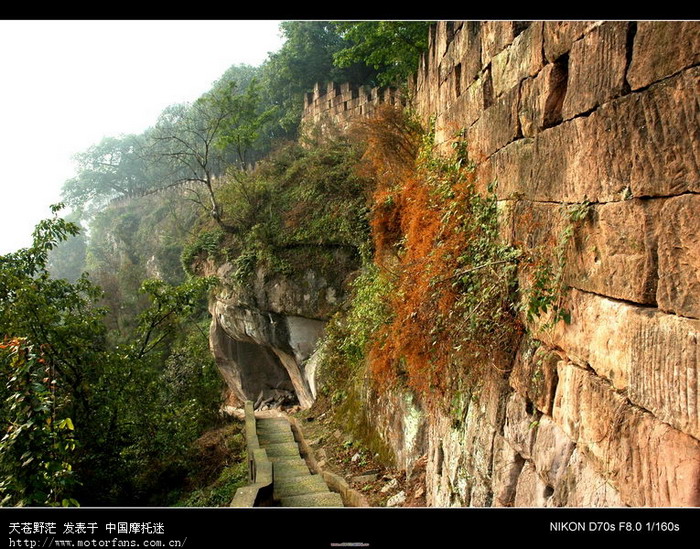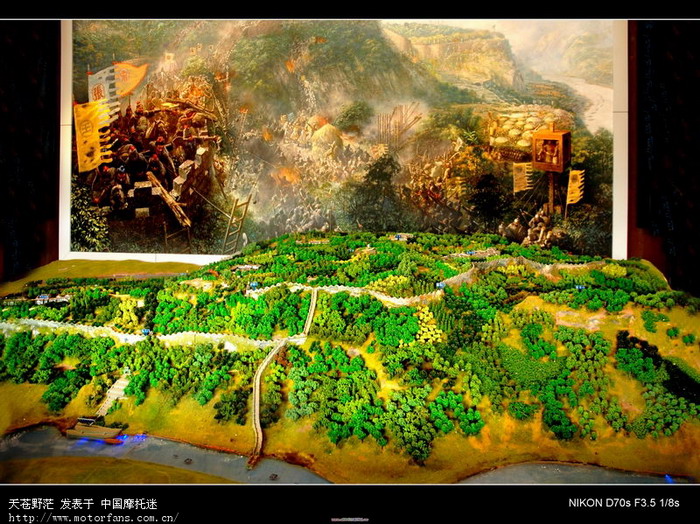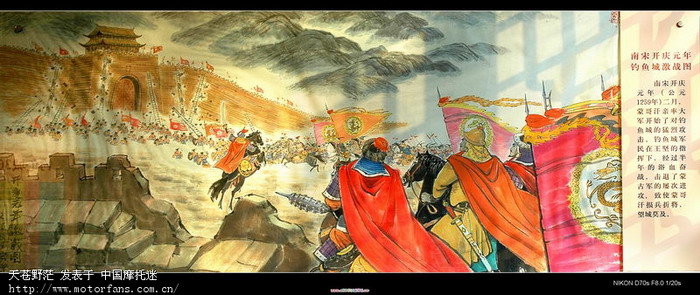


Notice: This is the official website of the All Empires History Community (Reg. 10 Feb 2002)
Chinese Military Conduct Against Steppe Armies |
Post Reply 
|
Page <1234 15> |
| Author | |||||
The Charioteer 
Colonel 
Joined: 16-Feb-2006 Online Status: Offline Posts: 735 |
 Quote Quote  Reply Reply
 Topic: Chinese Military Conduct Against Steppe Armies Topic: Chinese Military Conduct Against Steppe ArmiesPosted: 07-Mar-2008 at 12:39 |
||||
 |
|||||
Temujin 
King 
Sirdar Bahadur Joined: 02-Aug-2004 Location: Eurasia Online Status: Offline Posts: 5221 |
 Quote Quote  Reply Reply
 Posted: 07-Mar-2008 at 19:33 Posted: 07-Mar-2008 at 19:33 |
||||
|
well, how about some comments and sources for the pics?
|
|||||
 |
|||||
Omnipotence 
Baron 
Joined: 16-Nov-2004 Online Status: Offline Posts: 494 |
 Quote Quote  Reply Reply
 Posted: 07-Mar-2008 at 21:42 Posted: 07-Mar-2008 at 21:42 |
||||
|
The first couple are accurate and something I could depend on, but the last couple are from dramas and not something I would rely on. However, the first picture is a trebuchet, and as far as I can recall it was not used on steppe warfare. It's useful in sieges, for both the attacker and the defender, but on the steppe ballistas were the preferred siege machines instead. Where were the pictures taken? In a museum I'm guessing?
|
|||||
 |
|||||
Sarmat 
Caliph 
Joined: 31-May-2007 Location: United States Online Status: Offline Posts: 3113 |
 Quote Quote  Reply Reply
 Posted: 08-Mar-2008 at 03:09 Posted: 08-Mar-2008 at 03:09 |
||||
What are you talking about? Tang were succesful in their conquests only due to the fact that their armies consisted mainly of Turk cavalry. Even Han's western expeditions were mainly conducted by the use of the local tribes, mainly Nomadic.
Turks conducted the warefare in their own way, not Chinese. Also when I meant professional soldiers I meant "expert soldiers." Sorry for the confusion it caused. The life of Nomades was much harder than the life of an average Chinese, that's why Nomades usually were more tough. Also every Nomad was much more expert in riding a horse and shooting a bow than any Chinese soldier. Also Nomadic horses were much more fit for the warfare in the steppe than any Chinese horses. Let's don't forget that already during Han Chinese were trying to get "Heaven's horses" from Central Asia in order to counter Nomadic horses.
You also continue to emphasize the inferioriy of Xiongnu, while I'm saying that you also should consider that later Nomades including Turks, Uighurs, Zhurzhen etc did have advances weapons and heavy cavalry.
Also we know that the Chinese and Korean bows are simply the copies of Nomadic bows not vice versa, which meant that Nomadic warfare had more advanced technology at least in this regard.
Chinese armies were usually more numerous. Simply because China as a developed sedentary civilization was able to feed many people. The life in the Steppe on the contrary was very harsh and the number of Nomades was always very small. A lot of people simply couldn't survive in the steppe. For this very reason Chinese always mobilized more numerous armies than the nomades could ever afford. However, paradoxically few Chinese expeditions against the nomades which were succesful were conducted by relatively small "special forces" groups which usually if succesful remove or steal the herds of the nomadic tribe which was under attack which already meant victory because nomades couldn't survive in the steppe without their horses and cattle.
Nevertheless, for some reasons Chinese, mostly conducted large scale scale expedition to the North which most of the times were unsuccesful as a rule. For the simple reason inability to supply the large number of people in the steppe.
Perhaps it was indeed too far fetched that Taizong was living "complitely" nomadic life style, but he was extremely familiar with the nomadic culture and was extremely popular among Turks that's what I meant.
|
|||||
|
Σαυρομάτης

|
|||||
 |
|||||
Dream208 
Pretorian 
Joined: 22-Jan-2006 Location: China Online Status: Offline Posts: 176 |
 Quote Quote  Reply Reply
 Posted: 08-Mar-2008 at 18:55 Posted: 08-Mar-2008 at 18:55 |
||||
|
Sarmat12:
Just points out two things: 1. Most of major engagements Han conducted against XiongNu were conducted by the central plain forces, and the number between both sides were usually even numbered. 2. Since Han, Chinese army rarely use bow against Steppe Army, cross-bow were used instead. |
|||||
 |
|||||
Omnipotence 
Baron 
Joined: 16-Nov-2004 Online Status: Offline Posts: 494 |
 Quote Quote  Reply Reply
 Posted: 08-Mar-2008 at 20:01 Posted: 08-Mar-2008 at 20:01 |
||||
|
Samart, I think you are mixing ethnicity with nationhood. Just because one is Turkic doesn't mean he isn't a Tang subject(and I would like some first hand sources that these are Turkic, as stated before). Just because somone is "familiar" with Turkic lifestyle doesn't make him a non-Tang subject. Just because someone is well liked by Turks doesn't mean he belonged in a Turkic tribe. How bout some examples and sources that the Tang mainly used these Turkic armies? Though in the end it really doesn't matter, beyond ethnicity. Thus the difference would be negligent. As I have stated, Chinese frontier armies in the north usually attempts to resemble any other steppe army. The geography demands it so.
You need to calm down and get less emotional here. I had NEVER emphasized any inferiority on either side. I merely stated that facts. The sources I gave listed XiongNu strengths and weaknesses in comparison to Han armies. Yes, strengths AND weaknesses, with "and" being the key word(don't blame me if I trust primary sources over forummer opinions). Something I would appreciate if you would do the same in your own writings, something I have yet to see. Yet all I see is the emphasis on Chinese outnumbering the nomads, which I have already went over. More population does not equate with larger armies in steppe warfare. Large armies, due to its speed, won't even MEET a steppe army unless the latter wills it so, which is incredibly rare. The same Han source I had given had stated this. It's simply inefficient. As I've stated, when it comes to numbers it's a give and take scenario. Sometimes they outnumbered the opponent, and sometimes vice versa. In fact give me an example in which the steppe armies were outnumbered in a battle against the Chinese and I'll gladly give you a counterexample.( Although, of course, from what I read you would consider the Qing/Jin/etc... minority dynasties to be steppe while I do not. But that's all and good. Just note that if you do give examples of those dynasties than I would also give counterexamples of Song/Ming/etc... dynasties fighting them. In fact it would be to my advantage due to general YueFei, who fought over dozens of outnumbered battles and won each one) Edited by Omnipotence - 08-Mar-2008 at 20:19 |
|||||
 |
|||||
Sarmat 
Caliph 
Joined: 31-May-2007 Location: United States Online Status: Offline Posts: 3113 |
 Quote Quote  Reply Reply
 Posted: 08-Mar-2008 at 20:17 Posted: 08-Mar-2008 at 20:17 |
||||
|
I don't understand why you get back to Han/Xiongnu again and again? Why can't we discuss the later period as well? Also let's not forget that Xiongnu were crushed due to the involvenment of Xianbi, another Nomadic tribe. Please specify what sources do you exactly need and I'll gladly provide them. I also don't mean that the Turks who fought in Tang army were not Tang subjects. Of course they were Tang subjects. However, the topic is about alleged efficiency of "Chinese battle tactics" against the Steppans. What I mean is that the success of the Tang armies was mainly due to the use of the "Steppe battle tactice" by the Steppans against other Steppans. That' what I mean.
Also some examples of the behavoir of Taizong clearly are out of "Chinese standards." At one occassion he, for example, sucked the blood out of the wound of his Turkic general. I don't remember any other Chinese emperor who did the similar stuff. There is only one famous story with the same kind of behavoir, but it's about Gengghizkhan and Zhelme. Again, by saying that I don't mean that Taizong was a Turk himself. Just his attitude towards Turks was very natural and very repsectful with regard to the culture of the Nomades that's why he enjoyed such a high level of popularity among Turks, unlike, for example, later Tang emperors, who didn't care much about their nomadic subjects, but viewed them mainly as another "uncivilized" barbaric tribe of the North.
Edited by Sarmat12 - 08-Mar-2008 at 20:18 |
|||||
|
Σαυρομάτης

|
|||||
 |
|||||
Omnipotence 
Baron 
Joined: 16-Nov-2004 Online Status: Offline Posts: 494 |
 Quote Quote  Reply Reply
 Posted: 08-Mar-2008 at 20:38 Posted: 08-Mar-2008 at 20:38 |
||||
I don't know, maybe it's because you were talking about it? Everything on my last post that has to do with Han/XiongNu is a response to your accustation that I am emphasizing Xiong Nu inferiority, which I was not.
Just like how sedentary Chinese dynasties were also crushed due to the involvement of reviling/turncoating sendentary armies. And with that question, I thought you wanted to talk about something else besides Han/XiongNu? So am I assuming I can still talk about this time period?
Then we are in agreement. However, it should be noted that Chinese armies almost always used steppe tactics against steppe armies, because they are fighting "on the steppe". Just like how steppe armies would use Chinese tactics when sieging a Chinese city. Bringing battering rams onto the open plains or cavalry charges right into a 5 meter high earthen wall is not something a smart guy would do.
Yes, most emperors that are praised in history books would have moments like these(I believe the Turk who Tang Taizong helped was named Asma, he also administered the wounds of many other soldiers as well. It's a good way to inspire loyalty and fervor to the dynasty). But also note that in Chinese culture it's not about whether the subject is nomadic or not, it's about whether the subject admits the Mandate of Heaven. The latter is pretty much the Be All and Is All. Tang Tai Zong treated the revolting Mogher tribes pretty badly(he took no prisoners), but because Asma and the like admits the Mandate of Heaven(thus a subject), Taizong cared for him. Emperors who don't give a damn to nomadic subjects who admits the Mandate of Heaven probably wouldn't give a damn about sedentary subjects either. |
|||||
 |
|||||
The Charioteer 
Colonel 
Joined: 16-Feb-2006 Online Status: Offline Posts: 735 |
 Quote Quote  Reply Reply
 Posted: 09-Mar-2008 at 03:59 Posted: 09-Mar-2008 at 03:59 |
||||
                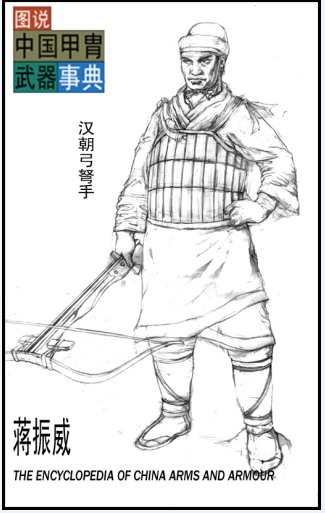 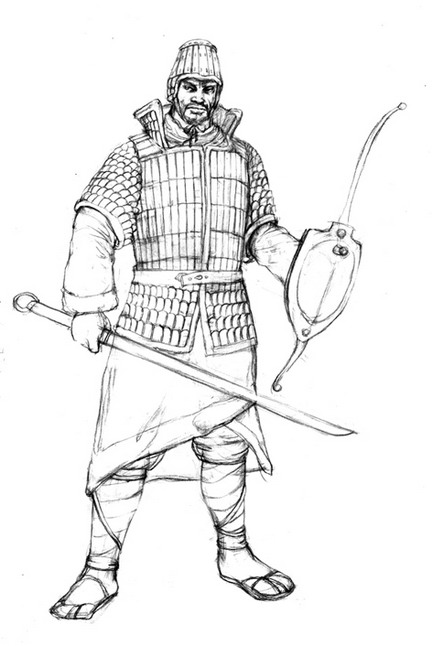 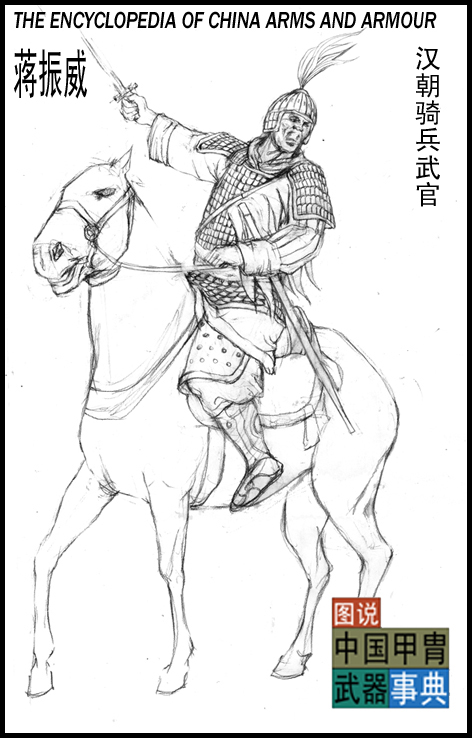                     The conscription system of the Western Han dynasty was inherited from the previous Qin dynasty, that all males of the right age has to serve in the army for at least one year during his lifetime, those serving in the capital Chang an will have the honor to be welcomed and rewarded by the emperor himself.
The Qin dynasty's military system of promotion based on ones military exploits was also inherited by the Western Han dynasty.
As a result, despite early Western Han dynasty enjoyed decades of relatively peaceful environment, the martial spirit that this military system bestowed upon soldiers of Qin hasnt waned during the Western Han period.
Furthermore, in preparation for future conflicts with the nomadic Xiongnu, Western Han government set up regulations to encourage the breeding of horses by its citizens, as a result of the measure, by decades of preparation, Western Han could accumulate 450,000 horses by the time of Wudi.
Hence, the Western Han military system ensured the quality of its military which laid firm foundation for future successful counter offensives against the Xiongnu on the steppe, and subsequently the military expansion of the Han empire. Edited by The Charioteer - 09-Mar-2008 at 15:57 |
|||||
 |
|||||
The Charioteer 
Colonel 
Joined: 16-Feb-2006 Online Status: Offline Posts: 735 |
 Quote Quote  Reply Reply
 Posted: 09-Mar-2008 at 15:31 Posted: 09-Mar-2008 at 15:31 |
||||
Diaoyucheng stronghold and some exhibits in commemoration of that historic chapter from its museum.
The last three are the screenshots from TV drama reflecting that part of history. And as one can see from the first screenshot it was filmed in Diaoyucheng, depicting Southern Song soldiers defending against invading Mongol army, in second screenshot are Southern Song generals for the defense of Diaoyucheng, the third screenshot depicts Mongke, the Great Khan of the Mongol empire.
In military history of the Mongol empire, no other battlescene for the conquering Mongol army witnessed such prolonged and fierce resistance as in the case of Diaoyucheng, its 100,000 military and civilian personnels withstood more than 200 battles against the invading Mongol horde for 36 years, despite the repeated assaults of main military forces of the Mongol empire and the numerical advantage of the invader, and despite the Great Mongke Khan (under whos reign the Mongol empire reached its greatest martial zenith as an uniting force Chingiskhan's empire covered much less territory compared to Mongke period, Kubilai's success in establishing the Yuan dynasty and conquering South Song and beyond doesnt prevent the actual split of the empire ever since the death of Mongke at Diaoyucheng which sparked internal rivalries among the Mongol nobility) personally commited to the siege, Mongols never managed to conquer the Southern Song stronghold by military means. And Mongke is the only Great Khan in the history of the Mongol empire fallen during its military conquest, he was killed by artillery of Southern Song defenders of Diaoyucheng stronghold, the Mongol commander of that siege was also killed during the siege.
Imagine if it was "the West" who was defending against the main forces of the Mongol empire, and it was some "western" stronghold managed to achieve such feat, modern world would see numerous works to propagate such history, Discovery Channel, PBS, BBC, National Geographic, Hollywood films, Western literatures etc.
Instead, Diaoyucheng is "nonexist" in reality, the myth like "peasant horde" or "human wave" regarding Chinese military history is prevailing and popular instead.
Which reminds the saying "history is just like a whore, everyone who got the money can have a go with her". Edited by The Charioteer - 09-Mar-2008 at 16:46 |
|||||
 |
|||||
Omnipotence 
Baron 
Joined: 16-Nov-2004 Online Status: Offline Posts: 494 |
 Quote Quote  Reply Reply
 Posted: 09-Mar-2008 at 23:11 Posted: 09-Mar-2008 at 23:11 |
||||
|
Yes, the siege of Diaoyucheng(Fishing town) is very neglected in history. The death of Mongke caused the Mongol heirs to bicker amongst themselves on who becomes the next Khan, culmultating into the event which the Mongolian Empire was split into many fractions. If Mongke lived, the Mongolian empire might have been the largest empire in history, instead of the British Empire, for then they would have the entirety of Southern China inside their boundaries. Funny though, how the Mongolian empire were able to take huge Song (and others, of course)metropilitans and fortified castles, but can't effectively siege one tiny town. Of course, Fisihing Town is located at a geographically defensible place, with a good leader to boot.
Shoot! That's a very vivid quote! |
|||||
 |
|||||
Sarmat 
Caliph 
Joined: 31-May-2007 Location: United States Online Status: Offline Posts: 3113 |
 Quote Quote  Reply Reply
 Posted: 10-Mar-2008 at 00:29 Posted: 10-Mar-2008 at 00:29 |
||||
|
This is just a speculation. Moreover, it's simly incorrect since the sons of Genghis Khan started to bicker already when he still was alive. Perhaps, the most important factors for the stop of the Mongolian expansion to the West was the death of Ogedei, not Mongke.
Moreover, it's nothing unusual that Mongols were defeated at Diaoyucheng. It happened many times before at other places. Mongols were repelled at Krakow in Poland for example. Or there was a small wooden town in Russia called Kozelsk which holded the entire army of Batu-khan for 7 weeks. Eventually, Mongols took over, but their casualties were so heavy that they called Kozelsk "evil town." Mongol army once even was defeated by the inferior force of Volga Bulgars in the open field even though at that time it was headed by the best Mongolian general Subudai. I don't think a lot of people know much about the episodes above either. Mongolian failure at Diaoyucheng was essentially strategically meaningles, except that the great khan was killed in battle, which indeed was unusual, but didn't change the outcome of the war, since Song was eventually conquered.
Also, Mongolian royal princes were killed in battle before, the youngest son of Genghis khan, Kulkan was killed at Kolomna in Russia for example.
And also the last thing is that AFAIK Mongol empire is considered the largest empire ever existed in history by the seize of the territory controlled and for this purpoes it includes Southern Song as well. The empire officially desingetgated only after the death of Kublai khan.
|
|||||
|
Σαυρομάτης

|
|||||
 |
|||||
Omnipotence 
Baron 
Joined: 16-Nov-2004 Online Status: Offline Posts: 494 |
 Quote Quote  Reply Reply
 Posted: 10-Mar-2008 at 03:23 Posted: 10-Mar-2008 at 03:23 |
||||
|
^The siege of DiaoyuCheng was "strategically meaningless" for the Song? Kind of, it helped stall the invasion but ultimately the Song was destroyed. But "strategically meaningless" overall? No, because due to the siege many troops in Egypt and Syria was called instead to attack the Song. That is the point. Mongols were defeated many times, that is true(Mongolians winning every battle being a stereotype), which happened in Asia as well as Europe, sometimes with only an army of several hundreds(as can be seen by the Jin dynasty, which scored victories at Fengxiang, Changan, Gui'de, etc...). But what's important was that Mongke died in this campaign. The death of Ogedai might have stopped the invasion of Europe and shown some Mongolian instability, but Mongke's rule soldified the Mongolian empire, which is still under one central figure. Although Kublai the successor still ruled a unified empire, fractions already arose and he couldn't prevent civil war, not from his conquered subjects, but from Mongolian fractions themselves. Khanates as far west as the Golden Horde refused to acknowledge the legitimacy of Kublai Khan. If the Mongol Empire was unified on anything, it was unified on paper, if even that.
|
|||||
 |
|||||
Sarmat 
Caliph 
Joined: 31-May-2007 Location: United States Online Status: Offline Posts: 3113 |
 Quote Quote  Reply Reply
 Posted: 10-Mar-2008 at 04:57 Posted: 10-Mar-2008 at 04:57 |
||||
|
It was strategically meaningless because Song was conquered at the end. It was tactically beneficial for Song because it delayed its final fall for some time but not more than that. And also fractions arose very early. Genghis khan could hardly pacify the deep conflicts between his children. It's also believed that he ordered the assisanation of Jochi, his own son.
|
|||||
|
Σαυρομάτης

|
|||||
 |
|||||
The Charioteer 
Colonel 
Joined: 16-Feb-2006 Online Status: Offline Posts: 735 |
 Quote Quote  Reply Reply
 Posted: 10-Mar-2008 at 06:53 Posted: 10-Mar-2008 at 06:53 |
||||
Sounds like the typical "history is written by the victor"
sure, and the Yuan only delayed the rise of Ming dynasty. and when China managed to fight with America on Korean peninsula, the Nomadic conquest of China in history only delayed the rise of modern China. "history" is no more than victor's bitch.
True, fractions arose early even when Chingiskhan was still around, yet Mongke consolidated the Mongol empire as an uniting force, Batu, ruler of the "Golden horde khanate" was strong supporter of Mongke's succession as the Great Khan, Hulagu, ruler of the "Il Khanate" was the brother of Mongke, although the descendants of Ogedei were Disgruntled that the descendants of Tolui have robbed the throne of Great khan from them, but with political and military authority of the Mongol empire in their hands, the empire was still an uniting force, and if it wasnt for Mongke's death at the siege of Diaoyucheng, Hulagu who has already conquered Bagdad and Damascus was well on his way of assaulting the Ayyubid dynasty, but the death of Mongke redirected Hulagu as well other Mongol nobility's attention because of succession problem, as result, the advancement of the Mongol in the Islamic territory was halted.
Civil war broke out for the first time, Kubilai fought his brother Arigh Boke for the throne of Great khan, the internal rivalries among the Mongol nobility never escalated during the reign of Chingis or Mongke.
Despite Kubilai emerged as the Great khan and he was successful in conquering the Southern Song in his domain of China, and he also suppressed those who opposed his throne as the Great khan,he could no longer able to command the Mongols as an uniting force. The khanates of the Mongol empire began their own journey of development, the "world conquest" by the Mongol army then reduced to "Regional conquest".
Which would be in consistency with the story that Chingiskhan doubted whether or not Jochi was his son. Jochi and Chagatai had quarrel with each other over their rights of former Khwarzimian territory. If the assassination of prince is ordered by Chingiskhan himself in order to prevent future internal conflict within the Mongol empire, then the choosing of Jochi instead of Chagatai may reflect the antecedent about Jochi.
Ironically then, it was the descendants of his own sons, Ogedei and Tolui, triggered such internal conflict that Chingiskhan tried to prevent.
Edited by The Charioteer - 10-Mar-2008 at 07:07 |
|||||
 |
|||||
Sarmat 
Caliph 
Joined: 31-May-2007 Location: United States Online Status: Offline Posts: 3113 |
 Quote Quote  Reply Reply
 Posted: 10-Mar-2008 at 07:22 Posted: 10-Mar-2008 at 07:22 |
||||
|
The conflict was there many years ago before Mongke's death. Also, Ghenghiz khan's children pretty much relied on their own from the very beginning. Batu's conquest of the West was done mainly by his Turkic subjects. Also one can't say for sure which delay was more significant Batu's delay of conquest of Europe or Hulagu's conquest of Egypt. From what we know now, it seems that the conquest of Europe would have had more significance. In fact, Hulagu's conquest of Bagdad and the murder of Khalif was already the most serious blow to the Islamic world. It's hard to say whether the subsequent conquest of Egypt would make a huge difference. "The job" was already done. Finally, if you think that history is just a "victor's bitch" than what is the point of discussing the stuff at all? The point is that what the tactical Song's success at Diaoyucheng meant? Did it mean the victory in the war? No. It was a brilliant, yet, temporary success, before the final collapse. Simply as that. Edited by Sarmat12 - 10-Mar-2008 at 07:23 |
|||||
|
Σαυρομάτης

|
|||||
 |
|||||
The Charioteer 
Colonel 
Joined: 16-Feb-2006 Online Status: Offline Posts: 735 |
 Quote Quote  Reply Reply
 Posted: 10-Mar-2008 at 08:26 Posted: 10-Mar-2008 at 08:26 |
||||
|
Without the leader wolf,the potential of the wolf pack is reduced.Its like that.
right, "from what we know NOW", simply because the modern "West" is more dominant and influential than "East"? but that can not be said the same for contemporary Middle east with the 13th century Mongol empire. And thats precisely why history shouldnt be treated as "the victor's bitch"
Sure, Chingiskhan didnt anticipate either the war with Khwarzim or the war with the Russian principalities, as his initial and lifelong ambition was the destruction of Jurchen Jin dynasty who once subjugated the Mongols, yet the victories over Khwarzim made it possible for further conflict with the Islamic world, and Subudai's accidental incursion into the Russian territory and the defeat of Russian army triggered future expansion of the Mongol and the establishment of the "golden horde khanate". When Chingiskhan began his revenge on the Jurchen Jin, he didnt anticipate future conquest of Southern Song, when his successor Ogedei was following his last wish of complete destruction of the Jin, Mongols were allies with Southern Song, the Song not only let the Mongol army pass their territory, they coordinate joint offensives on the Jurchens, which made it finally collapsed under the pressure.If Southern Song knew that oneday the Mongols would assault their dynasty too would they agree to forge such alliance? Because the primary objective for Chingiskhan and his heir Ogedei Khan was the conquest of Jurchen Jin, only that with experience of their military triumphs, grows more ambition.For Chingiskhan he didnt instruct the heirs of Mongol empire the conquest of Southern Song, his last wish emphasized on the Jurchen Jin, so when Ogedei finally fulfilled Chingiskhan's wish of destroying the Jin, can one also say the "job" is already done?
right, it was "i think history is just a "victor's bitch""...
The point is history is still "the victor's bitch". |
|||||
 |
|||||
Seko 
Emperor 
Spammer Joined: 01-Sep-2004 Online Status: Offline Posts: 8595 |
 Quote Quote  Reply Reply
 Posted: 10-Mar-2008 at 14:43 Posted: 10-Mar-2008 at 14:43 |
||||
|
Good information on this thread guys. Keep it up. One correction though. History seems to be the "Victor's bragging rights and loser's bitch". |
|||||
 |
|||||
Omnipotence 
Baron 
Joined: 16-Nov-2004 Online Status: Offline Posts: 494 |
 Quote Quote  Reply Reply
 Posted: 10-Mar-2008 at 16:51 Posted: 10-Mar-2008 at 16:51 |
||||
Hmmm, I thought the delaying of an invasion would be strategic instead of tactical, since strategem has to do with the movement of armies on the whole, while tactics has to do with the movement of armies on the battlefield.
|
|||||
 |
|||||
Temujin 
King 
Sirdar Bahadur Joined: 02-Aug-2004 Location: Eurasia Online Status: Offline Posts: 5221 |
 Quote Quote  Reply Reply
 Posted: 10-Mar-2008 at 20:11 Posted: 10-Mar-2008 at 20:11 |
||||
|
whoah, hold on guys, there are some serious misconceptions going on here. first, about the family tree and sucession: the youngest son (Tolui) was the heir all along. i never figured out where this Jochi vs Chagatai myth came from but the youngest son gets the spoil, this is Tolui. Tolui died early so the second youngest (�g�dai) became great khan. Jochi wa snot at all disliked by Chinggis qaan and we can already read this in the ShoM. if Chinggis had a dislike of Jochi because of his supposed bastard origin, he had not accepted and perhaps killed him instantly, there really was no logical reason at all to wait for this until much later. now about M�ngke & sucession struggle. now for the first time, the crown of Qaan was again with the Toluids, this was of course disputed by Qaidu. anyways, after M�ngkes death, Arigh B�ke was elected but defeated by Kubilai and his Chinese vassals. this, and his establishing of the Yuan dynasty was enough for the Chaghatay khanate and ulus Jochi to not recognize him as legal. his brother h�l�g� of the Ilkhanate however recognized him. so Kubilai was never ruler of a unified mongol empire.
about the mongol defeats, it is not known if the Volga Bulgars defeated Jebe at all, this is claimed by the Volga Bulgars but far from certain. we know Jebe made it back to Kwarazm with the expedition force and it seems unlikely he was defeated or at least not badly beaten at all. |
|||||
 |
|||||
Post Reply 
|
Page <1234 15> |
| Forum Jump | Forum Permissions  You cannot post new topics in this forum You cannot reply to topics in this forum You cannot delete your posts in this forum You cannot edit your posts in this forum You cannot create polls in this forum You cannot vote in polls in this forum |
Copyright ©2001-2009 Web Wiz
This page was generated in 0.078 seconds.











 Printable Version
Printable Version Google
Google Delicious
Delicious Digg
Digg StumbleUpon
StumbleUpon Windows Live
Windows Live Yahoo Bookmarks
Yahoo Bookmarks reddit
reddit Facebook
Facebook MySpace
MySpace Newsvine
Newsvine Furl
Furl Topic Options
Topic Options